Do you ever stop to really listen to what your body is trying to tell you? Every individual carries a distinct physiological and metabolic blueprint and recognizing these nuances can unlock remarkable benefits for your overall wellbeing.
Understanding your body’s unique needs is crucial for optimizing energy, enhancing mood, and preventing chronic health issues.
Harvard Health suggests that by recognizing your body’s natural hunger and fullness cues, you can transition from a restrictive diet to a more sustainable and nourishing one.
By recognizing patterns in nutrition, exercise, hydration, and emotional wellness, you can ensure efficient fueling, precision in movement, and improved mental health.
Personalized nutrition trackers and adaptive fitness platforms offer insights into body responses to food, workouts, lifestyle adjustments, and mindful tracking of sleep, hydration, and stress patterns.
This article explores body aspects like metabolism, hormonal signals, recovery needs, and lifestyle triggers to develop sustainable health approaches, empower informed decisions, and transform daily routines into body-centric rituals.

Why Everybody is Different
Recognizing your body’s unique needs allows you to make smarter, sustainable, and personalized choices, despite often comparing yourself to others online.
The Science Behind Individual Differences
The body’s unique physiology, influenced by factors like metabolism and immunity, can lead to a mismatch between diet and exercise trends, causing frustration and injury.
Observe your body’s responses to food, exercise, and routines using a health journal or wearable tracker to gain insights and make individualized decisions.
I tried a high-protein diet to boost my workouts, but it made me feel tired. When I added more complex carbs and balanced my portions, my energy came back fast. That is when I learned — listening to your body can change your results.
Genes or Habits Drive Your Health
Genetics provides a blueprint, but lifestyle influences it. Daily choices have immense power, but some assume genetics solely determine health outcomes, creating a sense of helplessness.
Focus on actionable lifestyle factors like nutrition, sleep, physical activity, and stress management to significantly influence your body’s outcomes, even if you have a genetic predisposition to certain conditions.
Heart disease runs in my family, but I chose to change the story. I started walking every day, added high-quality Omega-3 supplements, and found simple ways to manage stress. Over time, my heart got stronger proof that lifestyle can rewrite your genes’ plan.
How Age and Gender Affect Your Body’s Needs
The body evolves over time, with age, gender, and nutritional requirements influencing health. Many health programs overlook these nuances, offering one-size-fits-all solutions.
Customize routines for different life stages, focusing on iron, calcium, muscle preservation, and testosterone decline, with regular check-ups and personalized nutrition plans significantly improving overall health.
When I turned forty, my energy dropped after workouts. I adjusted—moved slower, added vitamin D and magnesium, and started tracking my sleep. Soon, I felt stronger which proved that smart habits really keep us young.

Tune In to Your Body’s Signals
Understanding your body’s signals is crucial for managing health, as it constantly communicates with you, and understanding these messages can significantly improve your well-being.
Recognizing Physical Fatigue
Why it matters:
Fatigue can indicate nutrient deficiencies, dehydration, poor sleep, or stress-related conditions, leading to reduced productivity, increased irritability, and weakened immunity if ignored.
How to do it:
- Watch your energy levels and notice when you feel tired during the day.
- Improve your nutrition by eating more whole foods packed with protein, complex carbs, and healthy fats.
- Make rest a priority with short naps or a steady bedtime routine to boost your energy every day.
- Stay hydrated every day—your body can mistake thirst for tiredness.
Interpreting Hunger and Cravings
Why it matters:
Cravings can indicate deficiencies or emotional needs and disregarding them can slow metabolism or lead to overeating later.
How to do it:
- Listen before you eat. Stop and ask yourself, “Am I really hungry or just feeling stressed?”
- Pick nutrient-rich foods that fill you up and fuel your body, like greens, nuts, and lean meats.
- Track your cravings by writing them in a small journal. Notice how they change with your mood, sleep, or hormones.
- Eat balanced meals with fiber and protein to keep hunger steady and energy strong.
Noticing Digestive Signals
Why it matters:
Bloating, gas, or irregular bowel movements indicate digestive imbalance, which impacts nutrient absorption, energy, and mood.
How to do it:
- Watch how your body reacts to food. Notice which meals cause discomfort.
- Consume mindfully by chewing thoroughly and eating slowly to aid digestion.
- Add probiotics with fermented foods such as yogurt or kimchi to keep your gut healthy.
- Stay hydrated because drinking enough water keeps your digestion smooth and helps stop constipation.
Understanding Sleep Patterns
Why it matters:
Circadian rhythm impacts energy, hormone balance, and cognitive function. Chronic poor sleep can cause fatigue or mood swings, impacting daily performance.
How to do it:
- Keep a steady sleep routine by going to bed and waking up at the same time every day, even on weekends.
- Make your bedroom calm and cozy by keeping it dark, quiet, and cool for better sleep.
- Cut down on caffeine and screen use before bedtime to help your body relax and sleep better.
- Use sleep trackers wisely, they show your sleep patterns and help you find simple ways to rest better.
Reading Emotional Signals
Why it matters:
Emotional states like irritability, anxiety, or sadness indicate unmet needs or stress overload, which can worsen physical and mental health issues if ignored.
How to do it:
- Take five minutes each day to reflect and spot stress early.
- Try meditation, deep breathing, or a walk in nature to lower stress.
- Watch how your feelings affect your actions and see if stress makes you eat too much, sleep less, or skip exercise.
Recognizing Pain and Discomfort
Why it matters:
Pain signals the body’s most direct warning, and even mild discomfort should not be ignored, as ignoring them can lead to chronic conditions or injury.
How to do it:
- Track what causes discomfort by paying attention to activities, foods, or body positions that bother you.
- Fix your posture, stretch often, and use ergonomic tools to reduce strain.
- Move carefully and stay active because gentle exercise eases pain but pushing too hard makes it worse.
- Seek help from a healthcare provider if pain does not go away.
Listening to Energy Fluctuations
Why it matters:
Energy fluctuations reveal metabolic health, hydration, and mental load, which can be overlooked, leading to burnout or poor decision-making.
How to do it:
- Pay attention to when you feel most awake or tired each day.
- Eat protein and complex carbs to keep your energy steady throughout the day.
- Match your toughest tasks with the times you have the most energy.
- Take short breaks to refresh your mind and body.
I pay attention to my body’s signals so I can create personalized nutrition, exercise, and lifestyle habits that boost my energy, lift my mood, and improve my health over time.
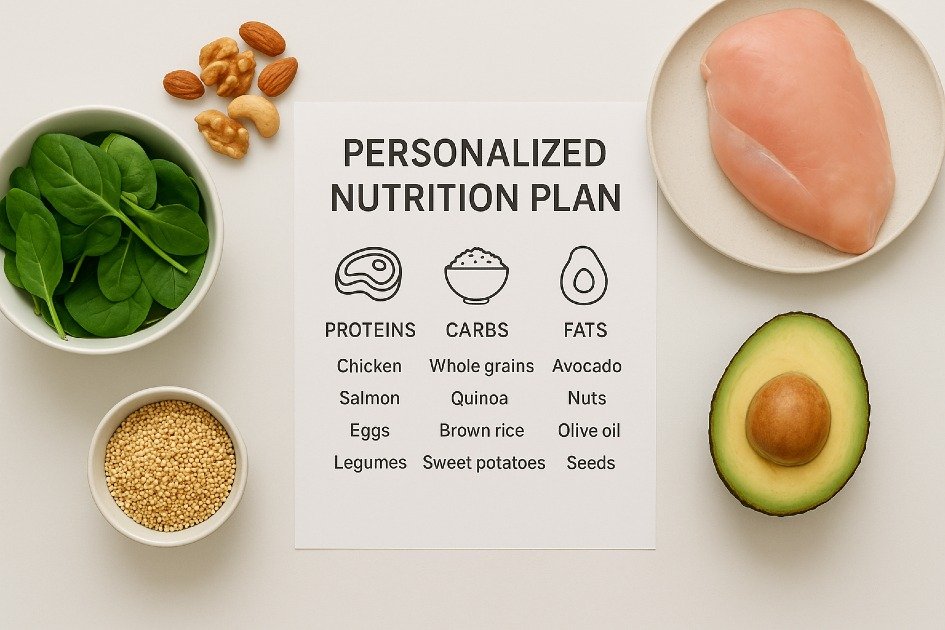
Eat the Right Nutrition for Your Body’s Needs
Understanding your body’s uniqueness is crucial for effective nutrition, as food choices impact energy, mood, and long-term health.
Discover Your Body’s Exact Nutritional Needs
Why it matters:
Individual nutritional needs vary due to genetics, metabolism, and lifestyle, and ignoring them can lead to fatigue, weight fluctuations, and long-term health issues.
How to do it:
- Keep a record of everything you eat for one week to notice patterns in your diet.
- Notice which food boosts your energy and which makes you feel tired.
- Start adding more nutrient-rich foods such as leafy greens, lean proteins, and whole grains to your meals little by little.
How Metabolism Influences Food Choices
Why it matters:
Understanding your body’s unique calorie burning rate can prevent overeating or under-fueling, while misaligned food choices can disrupt energy levels and mood.
How to do it:
- Check your basal metabolic rate using online calculators or fitness apps.
- Match your meal sizes to how active you are each day.
- Try eating metabolism-boosting foods such as eggs, fish, and chili peppers to help your body burn more energy.
- Fuel your body with meals that combine carbs, proteins, and fats to keep your energy steady all day.
Recognizing Food Sensitivities and Allergies
Why it matters:
Food sensitivities can cause bloating, skin issues, fatigue, and digestive discomfort, leading to stress and nutrient deprivation if ignored.
How to do it:
- Track your meals and notice how your body reacts.
- Try removing foods you think may cause issues for 2–3 weeks and watch how your body reacts.
- Switch out less healthy foods for nutritious options, such as choosing almond or oat milk instead of dairy.
Balancing Macronutrients for Your Body
Why it matters:
Proteins, fats, and carbohydrates are essential for building and repairing tissues, supporting brain and hormone health, and providing energy, but imbalances can cause sluggishness, weight gain, or nutrient deficiencies.
How to do it:
- Find the right balance of protein, carbs, and fats for your body and goals.
- Eat protein like eggs, beans, or fish with every meal to stay strong and healthy.
- Opt for healthy fats like avocado, nuts, and olive oil for better heart and brain health.
- Choose whole carbs like quinoa, oats, and sweet potatoes instead of sugary processed foods.
Hydration as Part of Nutrition
Why it matters:
Water is essential for digestion, nutrient absorption, and maintaining body balance, while dehydration can mimic hunger, leading to overeating.
How to do it:
- Drink eight glasses of water every day and drink more if you exercise or the weather is hot.
- Eat water-rich foods such as cucumbers, oranges, and berries to stay hydrated and boost your health.
- Drink enough water every day by using apps or smart bottles to keep yourself on track.
- Cut back on sugary drinks because they can block your body from absorbing nutrients.
Meal Timing and Your Body’s Rhythm
Why it matters:
Consistent eating aids metabolism and prevents energy crashes, while disregarding natural hunger cues can strain digestion and blood sugar levels.
How to do it:
- Eat bigger meals in the morning and lighter ones at night to match your body’s natural clock.
- Try eating small, nutrient-packed snacks when your energy drops between meals.
- Eat lighter in the evening to keep your sleep and digestion healthy.
- Pay attention to your body and eat only when hungry, stopping once you feel full.
I pay attention to my body, notice its signals, and choose foods that fit my needs, making every meal both healthy and satisfying.
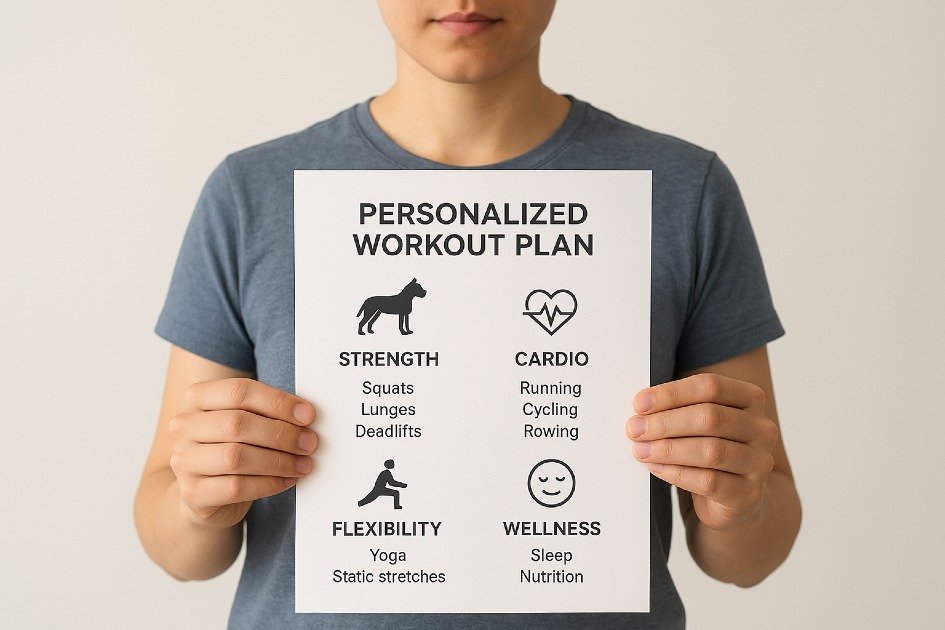
The Power of Personalized Exercise
Tailoring exercise to your body’s unique strengths, limitations, and rhythms is crucial for improving health, energy, mood, and longevity.
Finding the Right Type of Exercise for Your Body
Why it matters:
Exercise should be tailored to individual body types to minimize injury risk, boost motivation, and accelerate results, as endurance-based workouts may be too exhausting for some.
How to do it:
- Know your body type because ectomorphs, mesomorphs, and endomorphs react differently to exercise.
- Track when you feel most energetic and plan important tasks for those times.
- Try different workouts like cardio, strength training, yoga, or Pilates to find what fits your body best.
- Follow a training plan that matches your needs to exercise safely and effectively.
Build Strength Flexibility and Endurance Naturally
Why it matters:
Focusing on one fitness aspect can lead to imbalance, fatigue, poor posture, or injury. Strength, flexibility, and endurance improve metabolism, reduce tension, and support heart health.
How to do it:
- Build strength by doing resistance exercises 2–3 times a week with weights, bands, or your own body weight.
- Stretch your main muscles every day. Use moving stretches before workouts and hold still stretches after to stay flexible and strong.
- Build endurance with moderate cardio such as brisk walks, bike rides, or swims.
- Track your progress by noticing gains in reps, flexibility, and stamina to keep your motivation strong.
Avoiding Overtraining and Understanding Recovery
Why it matters:
Overuse exercise can lead to fatigue, injury, or burnout, requiring proper recovery to repair muscles and adapt to exercise for overall health and strength.
How to do it:
- Take 1 or 2 full days off each week to let your body rest and grow stronger.
- Paying attention to your body—soreness means growth, but sharp pain means stop.
- Try recovery methods like foam rolling, light stretching, and drinking plenty of water to help your body heal faster.
- Quality sleep helps your muscles heal and keeps your energy strong.
Move Smarter Every Day with Functional Fitness
Why it matters:
Functional exercises enhance balance, coordination, and core stability, reduce falls, enhance posture, and strengthen daily muscles for real-life movements.
How to do it:
- Core-focused exercises include planks, bridges, and twists.
- Practice natural moves like squats, lunges, and push-pull exercises that train your body for everyday strength.
- Keep pushing yourself by adding a little more weight or a few extra reps each week to help your body grow stronger safely.
Tailoring Exercise to Life Changes
Why it matters:
Life events like pregnancy, aging, and desk-bound work can alter body capabilities, necessitating exercise adaptation to ensure safety, effectiveness, and enjoyment.
How to do it:
- Adjust your workout when you feel tired by slowing down or choosing lighter moves to help your body recover safely.
- Focus on mobility with easy stretches and gentle workouts that keep joints strong and flexible as you age.
- Use adaptive equipment like resistance bands or light weights to protect your joints and build strength safely.
I follow a fitness method that fits my own rhythm. It helps me stay consistent, see actual results, and enjoy every workout as part of a lasting, healthy journey.
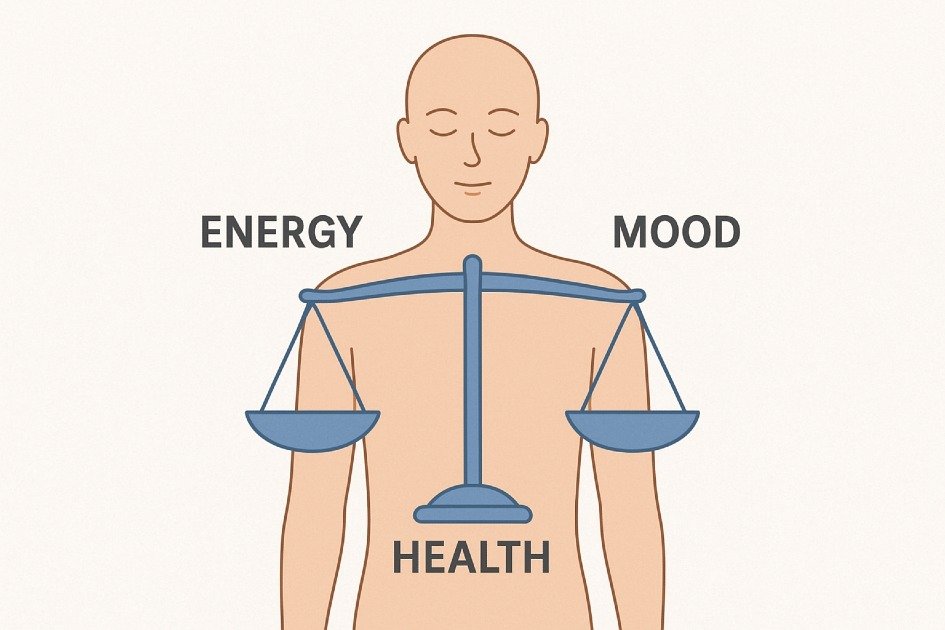
Hormones and Your Body’s Needs
Hormones, small chemical messengers, significantly impact body functions like energy levels, mood swings, and weight management. Understanding them is crucial for self-control and overall well-being.
How Hormones Influence Energy, Mood, and Weight
Why it matters:
Hormonal imbalances impact metabolism, fat storage, appetite signals, sleep quality, stress resilience, and memory, causing feelings of sluggishness, anxiety, and unusual hunger.
How to do it:
- Eat hormone-friendly foods by choosing lean proteins, leafy greens, and healthy fats.
- Get enough good sleep—about 7 to 9 hours each night.
- Move your body often with strength training and cardio to help keep your insulin and thyroid levels balanced.
- Manage stress with simple habits like meditation, deep breathing, or journaling to lower cortisol and balance your body’s hormones.
Recognizing Hormonal Imbalances
Why it matters:
Ignoring symptoms can lead to chronic problems, causing subtle imbalances like weight changes, fatigue, mood swings, or skin issues. Early recognition aids faster healing and prevents complications.
How to do it:
- Track your symptoms by writing down how you feel each day, including your energy, sleep, and mood changes.
- Get professional tests to check your thyroid, cortisol, or sex hormones with simple blood, saliva, or urine tests.
- Watch for body changes like weight, hunger, or digestion shifts.
Supporting Hormonal Health Through Nutrition
Why it matters:
Hormone production in the body is influenced by specific nutrients, and deficiencies in vitamins like B6, D, and minerals like magnesium or zinc can disrupt this process.
How to do it:
- Eating protein with every meal helps your body make hormones and keeps your blood sugar steady.
- Healthy fats from salmon, chia seeds, and walnuts help keep your brain sharp and your hormones balanced.
- Limit refined sugar because it quickly raises blood sugar, making your body release too much insulin.
- Hydrate wisely with water—it moves hormones and helps you flush out toxins.
Exercise and Hormonal Regulation
Why it matters:
Physical activity not only burns calories but also produces beneficial hormones, such as cortisol and testosterone, which can impact mood, sleep, and muscle health.
How to do it:
- Strength training builds muscle, speeds up metabolism, and naturally boosts testosterone for better strength and energy.
- Moderate cardio helps your body use insulin better and boosts endorphins that lift your mood.
- Yoga and stretching help your body stay flexible and calm.
Calm Stress to Keep Hormones Healthy
Why it matters:
Chronic stress causes the body to release cortisol, disrupting sleep, metabolism, and weight management, and over time, the body may become resistant to its effects, making stress more challenging to manage.
How to do it:
- Practice mindfulness daily with meditation, deep breathing, or gentle muscle relaxation.
- Spend time walking outdoors to lower stress and refresh your body naturally.
- Turn off screens before bedtime to boost natural melatonin and improve sleep.
- Build strong friendships and join support groups to keep your emotions balanced and your mood steady.
I boost my energy, lift my mood, and feel my best by keeping my hormones balanced with smart choices in food, exercise, stress control, and paying attention to my body.
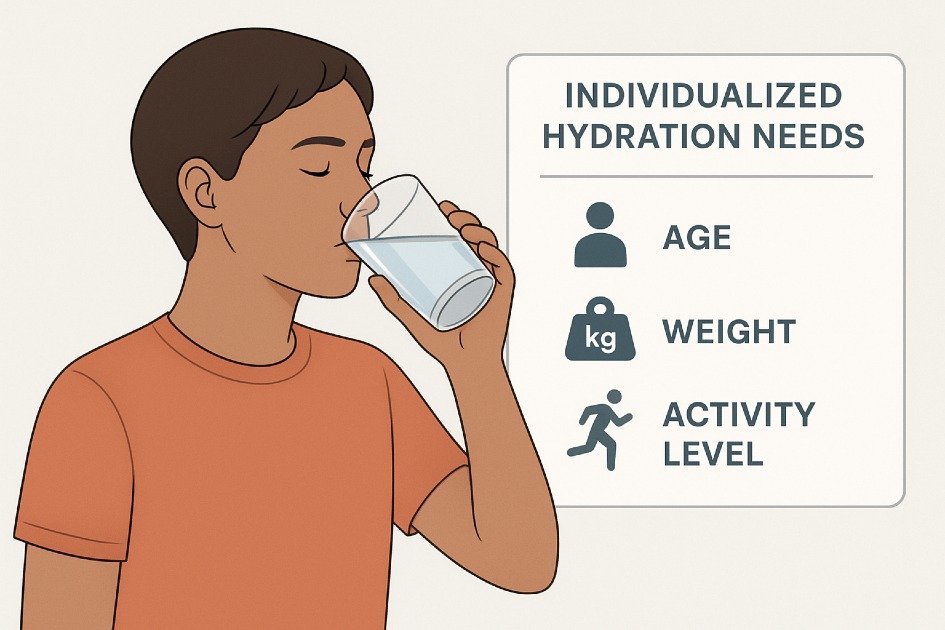
Hydration and Its Individual Requirements
Tailoring hydration to your unique body’s needs is crucial for improving energy, focus, digestion, and overall health, irrespective of lifestyle, environment, activity level, or genetics.
How Much Water Do You Really Need?
Why it matters:
Drinking too much can cause fatigue, headaches, and poor digestion, while too little can overwhelm kidneys and dilute essential electrolytes, impacting metabolism, mental clarity, and skin health.
How to do it:
- Drink 8 to 10 cups of water daily and change the amount if you are more active or in hot weather.
- Check your urine color because pale yellow shows you are well hydrated.
- Notice when you feel thirsty but drink water regularly too since your body might already be a bit dehydrated.
- Use hydration apps or calculators to track and adjust your water intake daily.
Notice How Your Body Shows Dehydration
Why it matters:
Dehydration can manifest as irritability, dry skin, or poor concentration, and recognizing these signs can help prevent more severe health issues.
How to do it:
- Monitor your symptoms for a week and watch for fatigue, cramps, dizziness, or headaches.
- Track your water intake daily to see how it affects your symptoms.
- Drink enough water before you start, sip regularly while active, and rehydrate after exercise to stay healthy and perform your best.
- Eat hydrating foods such as watermelon, cucumber, and leafy greens to help you stay properly hydrated.
Boost Energy with Electrolytes and Nutrient Drinks
Why it matters:
Water alone cannot replace essential electrolytes lost through sweat, and imbalances in sodium, potassium, magnesium, or calcium can negatively impact heart, muscle, and nerve function.
How to do it:
- Eat natural electrolyte foods like bananas for potassium, spinach for magnesium, and yogurt for calcium.
- Drink beverages with electrolytes when exercising hard or in hot weather to stay hydrated and perform your best.
- Skip sugary drinks and pick beverages that keep you hydrated without added calories.
- Talk to a nutritionist or health professional to find out if you need hydration supplements.
Stay Hydrated the Smart Way
Why it matters:
Hydration levels vary depending on activities like sedentary days, high-intensity workouts, or hot weather, necessitating a dynamic approach rather than a one-size-fits-all strategy.
How to do it:
- Drink 20–50% more water on active days to replace what you lose in sweat.
- Carry a refillable water bottle when traveling or in dry places to keep yourself hydrated.
- Drink water regularly by setting alarms or using a hydration app.
- Notice small signs in your body like tiredness or changes in skin bounce.
Boost Energy and Stay Vital with Smart Hydration
Why it matters:
Maintaining consistent fluid levels is crucial for optimal body function, supporting digestion, mental clarity, and weight management.
How to Do It:
- Start your morning with a glass of water to wake up your metabolism and fuel your energy for the day.
- Drink water with your meals to help your body digest food and absorb nutrients better.
- Try different water temperatures, chilly water wakes you up, and warm water helps your stomach work better.
- Try herbal teas or fruit-infused water to stay hydrated and add natural flavor.
I use a hydration tracker bottle to keep my body strong and healthy. It helps me see how much water I drink each day, keeps my energy up, and supports my overall well-being.

Sharpen Your Mind and Lift Your Mood
Understanding your body’s mental and emotional wellbeing is crucial for overall health, as stress, anxiety, and unresolved emotions can impact sleep, digestion, energy, and immunity.
Recognizing Stress and Its Impact on Your Body
Why it matters:
Chronic stress can cause high blood pressure, fatigue, and poor digestion, so early recognition is crucial for mental clarity and overall health.
How to do it:
- Write down your stress each day to spot what triggers it and how it changes over time.
- Notice signs like tense shoulders, headaches, or feeling restless.
- Pause for a few minutes each day to breathe and stay mindful. Even 2–5 minutes can refresh your mind and boost focus.
- Try simple breathing methods such as the 4-7-8 technique to calm your mind and relax your body.
Cultivating Emotional Awareness
Why it matters:
Unresolved emotions can cause physical discomfort or chronic tension, and emotional awareness can help prevent these stress-related symptoms by recognizing and addressing these emotions.
How to do it:
- Take 10 minutes each day to notice and understand how you feel.
- Name your feelings clearly by saying “I feel anxious” instead of “I feel bad.”
- Talk with a trusted friend or therapist to understand your feelings better.
- Do expressive activities such as writing in a journal, sketching, or recording your thoughts.
Building Resilience Through Positive Habits
Why it matters:
Resilient minds and bodies are formed through the development of coping skills, which enable individuals to manage life’s challenges without causing energy or health damage.
How to do it:
- Keep a steady sleep schedule to refresh your body.
- Do activities you enjoy, such as walking or yoga, to stay active and healthy.
- Repeat positive words each day to build confidence and quiet negative thoughts.
- Choose media that lifts you up and avoid sources that stress you.
Mind-Body Practices for Emotional Stability
Why it matters:
Meditation and tai chi techniques enhance the mind-body connection, lower cortisol, improve digestion, and boost overall energy.
How to do it:
- Start each day with five minutes of guided meditation to clear your mind and boost focus.
- Try gentle exercises like yoga or tai chi to ease stress and relax your body.
- Pay attention to your meals and notice how your body feels after eating different foods.
- Try using your senses—feel, smell, or see something—to calm your mind.
Social Connections and Support Networks
Why it matters:
Loneliness and social isolation negatively impact mental and physical health, while supportive connections reduce stress, boost immunity, and enhance resilience.
How to do it:
- Stay connected with family and friends by planning regular meetups, even online.
- Connect with local or online groups that share your hobbies and goals.
- Lend a hand to others and feel a stronger sense of purpose in life.
- Listen closely to others to strengthen your emotional connections.
Managing Anxiety and Overthinking
Why it matters:
Excessive worrying triggers the stress response, affecting sleep, digestion, and energy levels. Effective management of thoughts can prevent this cascading effect.
How to Do It:
- Turn big problems into small steps and tackle them one at a time instead of overthinking.
- Set aside a short daily time to focus on worries instead of letting “what-if” thoughts take over your day.
- Feel your feet on the floor and pay attention to your surroundings to stay grounded.
- Try cognitive behavioral exercises to change negative thoughts.
I focus on my mental and emotional health because it boosts my energy, strengthens my immunity, and helps me live longer, with small daily steps adding up to big benefits over time.
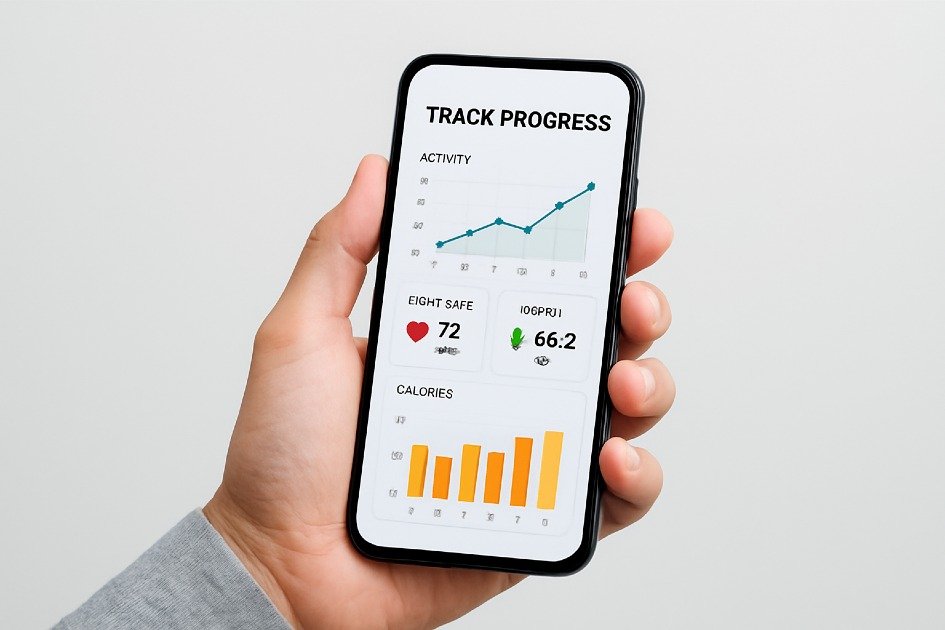
Monitor Your Body and Track Your Progress
Prioritizing mental and emotional wellbeing not only protects the mind but also enhances energy, immunity, and longevity, with small actions compounding overtime for a healthier life.
Track Health Smarter with Apps and Wearables
Why it matters:
Modern wearables and apps offer real-time health insights, enabling users to identify patterns like energy dips, sleep irregularities, and exercise response, transforming guesswork into data-driven decisions.
How to do it:
- Choose a wearable that monitors your heart rate, sleep, and daily activity. Some devices can also track water intake and nutrition.
- Begin with small, reachable goals like walking 5,000 steps a day or sleeping 7 hours each night.
- Check your trends each week and focus on averages to spot patterns instead of daily ups and downs.
- Connect your wearable to nutrition and hydration apps to track your body’s health in one place.
I track my health every day with a smartwatch and fitness tracker. They show my steps, heart rate, and sleep, helping me stay active and make smarter choices.
Journaling Your Health Patterns
Why it matters:
Journaling helps understand body signals like hunger, fatigue, mood swings, and skin changes, connecting habits and outcomes by decoding these subtle signals.
How to do it:
- Pick a format and start writing in a notebook or a digital app.
- Monitor your sleep, meals, water, mood, and exercise daily to stay healthy and strong.
- Track your triggers by noticing when you feel tired or stressed and what happened just before.
- Review your week, note progress, celebrate successes, and set goals for next week.
Unlock Health Insights with Your Biometrics
Why it matters:
Biometrics, such as blood pressure, glucose levels, and heart rate variability, provide a scientific view of the body, aiding in health prevention and optimizing energy, recovery, and performance.
How to do it:
- Check your resting heart rate, blood pressure, and weight regularly to track your health.
- Check your health with yearly or twice-yearly blood tests to track cholesterol, vitamins, and hormone balance.
- Monitor recovery by using heart rate variability to see if your body is ready for hard exercise or needs more rest.
- Use your biometric data to improve your diet, sleep, and workouts.
I check my health at home using devices like a blood pressure monitor or glucose monitor.

Your Body Strengthens as You Adapt
Understanding life’s unexpected challenges helps maintain health, energy, and resilience. Making small, practical adjustments can significantly improve long-term performance.
How Pregnancy Changes Your Body
Why it matters:
Pregnancy is a significant physical transformation involving hormonal fluctuations, increased nutrient demand, and weight shift, affecting energy, digestion, and mobility, potentially leading to fatigue and discomfort.
How to do it:
- Focus on nutrient-rich foods like leafy greens, lean meats, and whole grains.
- Keep your body strong and flexible by doing gentle exercises such as walking or prenatal yoga.
- Drink water often and balance electrolytes because your blood volume rises during pregnancy.
- Pay attention to your body and rest when you feel tired. Change your daily habits to avoid pushing yourself too hard.
Aging and Hormonal Shifts
Why it matters:
As we age, our body’s metabolism slows, muscle mass decreases, and hormone levels fluctuate, impacting weight, energy, and mood. Inadequate lifestyle adjustments can accelerate this decline.
How to do it:
- Do strength training two to three times a week to keep muscles strong and bones healthy.
- Add healthy fats such as omega-3s to boost brain health and keep hormones balanced.
- Get regular checkups to track your blood sugar, cholesterol, and hormone levels.
- Get enough sleep each night to help your body heal, strengthen your immune system, and keep your mind sharp.
- Adjust your calories as your metabolism changes while keeping meals nutritious.
Lifestyle and Career Changes
Why it matters:
Lifestyle changes, such as new jobs or relocations, can disrupt sleep, diet, and exercise routines, causing physical and mental stress.
How to do it:
- Prep meals ahead to keep your nutrition steady even on busy days.
- Try quick micro-workouts during breaks like stretching, walking, or simple desk exercises to stay active and energized.
- Practice meditation or journaling to lower stress and strengthen your mind and body.
- Follow a consistent bedtime routine to support good sleep, even when your daily schedule changes.
Recovery from Injury or Illness
Why it matters:
Injuries and illnesses can temporarily alter the body’s capabilities, and ignoring these changes can prolong recovery or lead to secondary health issues.
How to do it:
- Stick to a rehab plan made just for your injury to heal safely and regain strength.
- Boost recovery by eating anti-inflammatory foods such as turmeric, berries, and fatty fish.
- Start moving slowly to rebuild strength and keep your body safe from strain.
- Pay attention to pain and let it guide you to avoid injuries and stay healthy.
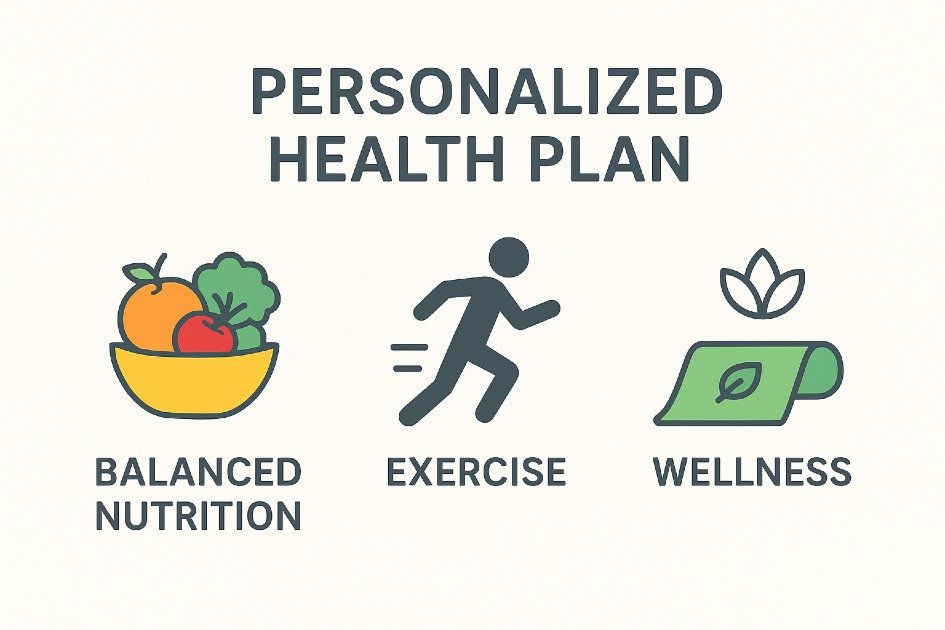
Building Your Personalized Health Plan
Designing a personalized health plan based on your body’s unique needs involves understanding your needs, making sustainable changes, and gaining energy, focus, and confidence.
Identify Your Body’s Nutritional Blueprint
Why it matters:
Understanding your body’s unique nutritional needs is crucial for maintaining steady energy levels and improving overall health over time.
How to do it:
- Keep a daily log of your meals for one to two weeks to spot how food affects your energy and digestion.
- Eat the right balance of proteins, fats, and carbs based on how active your body is.
- Pay attention to how your body responds to foods and explore testing for intolerances if problems continue.
- Eat a variety of colorful vegetables and whole foods to keep you strong and healthy.
Find a Workout That Fits Your Body
Why it matters:
A personalized exercise routine is crucial for health, mood improvement, and long-term motivation, as not all exercises are suitable for everybody type.
How to do it:
- Check your fitness and choose exercises you enjoy, like running, lifting, or stretching.
- Try 15 to 30 minutes each day and slowly make your workout harder as you go.
- Try different exercises that build stamina, strength, and flexibility.
- Pay attention to your body and slow down when you feel pain, tired, or sore.
Prioritize Sleep for Complete Body Recovery
Why it matters:
Sleep is crucial for the body’s cell repair, hormone balance, and memory consolidation, and lack can impact mood, weight, and immune function.
How to do it:
- Follow the same bedtime and wake-up time each day to strengthen your body clock and improve energy, focus, and overall health.
- End your day with reading, light stretches, or deep breaths to calm your mind and body.
- Switch off screens an hour before bed to let your mind and body unwind and enjoy deep sleep.
- Sleep better by using cozy bedding and keeping your room dark.
- Use apps or wearable devices to monitor your sleep and spot patterns that affect rest.
Manage Stress to Protect Your Body
Why it matters:
Chronic stress can cause inflammation, disrupt hormones, and potentially cause fatigue or illness, requiring effective management to maintain balance and enhance overall wellness.
How to do it:
- Focus each day on mindfulness, meditation, or deep breathing to calm your mind and boost well-being.
- Pause briefly during work to refresh your mind and body.
- Try hobbies that spark your creativity and calm your mind.
- Try writing in a journal to spot what stresses you and how you handle it.
Hydrate According to Your Body’s Needs
Why it matters:
Water aids digestion, circulation, and detoxification, while dehydration can cause headaches, fatigue, and poor concentration, requiring custom hydration for optimal body function.
How to do it:
- Keep sipping water all day instead of waiting until you feel thirsty.
- Match your food and drink to how active you are, the weather, and your size.
- Eat plenty of fruit and vegetables to stay hydrated and support your health.
- Drink electrolyte drink after hard exercise or when it is hot to restore lost minerals and stay energized.
Monitor Progress to Stay Aligned
Why it matters:
Tracking aids in understanding body functions and preventing relapses into old habits without providing feedback.
How to do it:
- Track your meals, workouts, sleep, and moods daily to stay aware of your health and spot patterns that improve your well-being.
- Track your progress by aiming to lift more weight or sleep better each week.
- Check your progress each week and change your plan to improve results.
- Track your steps, heart rate, and sleep with a wearable tracker to get insights that help improve your health.
Adapt to Life Changes Gracefully
Why it matters:
Flexibility is crucial in maintaining an effective and realistic health plan as your system needs change over time due to age, lifestyle changes, or medical conditions.
How to do it:
- Review your plan every few months and adjust it to your work, activity, or health changes.
- Adjust your diet, workouts, and sleep as your system needs change.
Recap: Embrace Your Body’s Unique Journey
Your body is a unique, complex system of cells, hormones, and energy rhythms that require attention, respect, and care.
Understanding your body requires curiosity, patience, and experimentation. Slight changes, like tuning into body reactions to food or exercise, can improve energy, mood, and overall vitality.
Embracing your body’s individuality and valuing its signals can lead to self-compassion and holistic well-being.
Harvard Health suggests shifting focus from weight or appearance fixation to focusing on the body’s capabilities, as healthy habits can lead to a thriving body.
By embracing your body’s uniqueness, you can nurture it, celebrate its capabilities, and experience extraordinary results. Treating your body as such will result in strength, clarity, and resilience.
Frequently Asked Questions
How do I know what my body really needs?
Observe your body’s signals, including fatigue, mood, digestion, and sleep quality, and use personalized tools like nutrition trackers to optimize your health for a sustainable lifestyle.
Can one diet or exercise plan work for everyone?
Each body has a unique metabolic blueprint, influenced by genetics, age, lifestyle, and hormonal balance. Diet and exercise regimens should align with the body’s structure, cardiovascular capacity, and recovery patterns.
How often should I check my health metrics?
Routine monitoring of various body metrics, including hormone levels and metabolic biomarkers, is crucial for maintaining optimal health and adjusting nutrition and exercise without guesswork.
What are the most common mistakes in ignoring body signals?
Neglecting body signals can lead to chronic health issues, as they serve as early warning systems, preventing minor issues from worsening into chronic ones.
How can I identify food sensitivities without testing?
Eliminate common allergens like gluten, dairy, and processed sugars to address food sensitivities, monitor body changes, and use a food-symptom diary for personalized diet adjustments.
Can stress really affect my body’s physical health?
Chronic stress can disrupt body balance, requiring stress-management techniques like mindfulness, breathing exercises, and guided meditation to stabilize effects and support resilient stress response.
How do I adapt my health plan as my body changes over time?
Regular assessment of physical performance, nutritional intake, and sleep quality is crucial for maintaining a healthy lifestyle, and adaptive wellness platforms can help adjust diet, exercise, and supplements accordingly.

